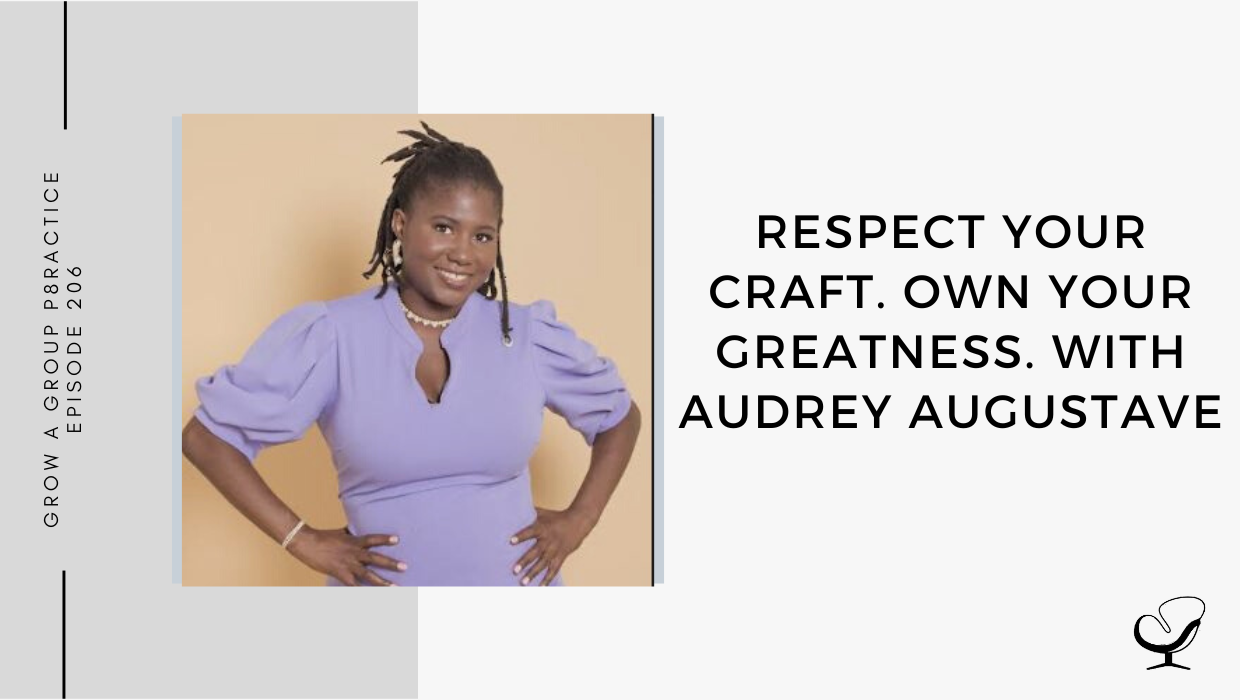Podcast (group): Play in new window | Download | Embed
Are you feeling inspired to develop your edge in therapy? Where did you uncover your niche? Has it changed from what it was when you started therapy?
In this podcast episode, LaToya Smith speaks about respecting your craft and owning your greatness with Audrey Augustave.
Podcast Sponsor: Pillars of Practice

Ready to take your practice to the next level? In our Pillars of Practice E-Courses, you will find FREE resources designed to help you take your private practice to the next level:
Over 20 FREE Downloadable resources and tools
8-minute expert videos on a variety of topics to help make your private practice stronger
3 hours of video training to make growing a practice quicker
What’s your phase of practice? Click here to get full access, totally free!
Meet Audrey Augustave

Audrey is a Haitian American who specializes in High Conflict Couples counseling. She has a podcast that explores mental health and identity-related topics through the Caribbean lens. She believes in living an intentional life and is currently learning to play the guitar and loves hula hooping.
Visit Audrey Augustave’s website, and listen to her podcast.
In this Podcast
- Discovering your niche
- Listen: to yourself and others
- How to discover what you enjoy
- Changing your niche
- Audrey’s advice to private practitioners
Discovering your niche
For Audrey, she’s honed in fully on her niche, which is high-conflict couples who are struggling in sexless marriages. Although, she has come to this point through many years and turns in her career. At the beginning of her career, Audrey started off working in addiction.
I went into it thinking; “Oh, I think I would rather work with (for the lack of a better word) … “average” people, but let me do this because I’ll earn my stripes this way”, but I loved to go to work. I felt like the work that I was doing was important. (Audrey Augustave)
Audrey enjoyed her work with patients recovering from addiction, so that was her main niche for about six to seven years. After some time, she noticed that she was often drawn to the family program. The families Audrey worked with responded so well to her that they began requesting direct counseling.
I just made the executive decision that when I’m done, I’m going to apply to private practices. I’m only going to apply to jobs that are private practices where I can try couples work. So, I did, and I got the job, and I found that I was doing well. (Audrey Augustave)
From working with couples, Audrey began to notice a way to bridge her interest in working with addiction, where there is a lot of anger and resentment and her interest in working with couples who are in high-conflict situations.
I found that I shine the best with couples that were on the brink of divorce, that weren’t getting along, maybe even weren’t sleeping in the same beds anymore … That [needed] pre-divorce work. (Audrey Augustave)
Audrey used to refer these couples out for sex therapy work since these couples likely had no intimacy at that time, she realized that she felt comfortable doing that work as well, so trained up so that she didn’t have to refer them out anymore.
Now, she’s working with her direct niche. It’s boiled down to the essentials, and Audrey has found the place where she feels that she truly shines in offering great therapy.
Listen: to yourself and others
When it comes to finding your niche, it’s not something that would elude you entirely. Once you get used to seeing and listening to the opportunities, it can become clear to know where you do your best work. Notice:
- How do you feel when you work with certain modalities or populations? What gets you excited? What inspires you to learn more?
- What are people telling you, like clients, supervisors, or fellow therapists? What do people compliment you on? What are your clients coming to you for and specifically requesting?
I didn’t choose it – it chose me. Like they were telling me; “You’re the family person!” And even my clinical supervisors, when they would write their reviews for me in my masters program … Would often say; “She’s really great with families” … So I was seeing the feedback which also led me to having the confidence when I was just watching a TV show [to know]; “I could do that. I should do that.” (Audrey Augustave)
How to discover what you enjoy
Figuring out what you’re enjoying has a little bit to do with trying different things, right? (Audrey Augustave)
The expression “you won’t know unless you try” also works with exploring and honing in on your niche. It’s unlikely that the first thing you do is the thing that’s the best fit for you – although it does and can happen, it is uncommon.
You’ll have to venture out into the field and attempt new things to see what works and what doesn’t, because you may be pleasantly surprised at what piques your interest. Of course, do this ethically. Don’t work with a client population that you have no interest or skill in navigating because it also puts them at risk. Be mindful while taking the initiative.
Changing your niche
There might be something amiss if you are changing your niche every year, but for it to progress and change as you do as a therapist is normal, and even encouraged to an extent. As you gain experience, become more credentialed, and change as a person and then as a therapist, the type of work that you do will also shift slightly.
I think it’s natural for that to happen … Even if somebody does couple’s work, I would presume that as time ebbs and flows, maybe at some point you’ll start doing high-conflict couples work, and then you’ll transition into maybe couples with erectile dysfunction concern, you know, there’s all these different levels of couples work that you could be doing. (Audrey Augustave)
Audrey’s advice to private practitioners
If you are looking for your niche or you can feel that it is changing, don’t be afraid to try new things! Seek, claim, and own your greatness.
Useful links mentioned in this episode:
- Visit Audrey Augustave’s website, and listen to her podcast.
- What’s your phase of practice? Click here to get full access, totally free!
- Find out more about Gusto and use the promo code JOE
Check out these additional resources:
Walking Towards A Better Version of Self with Iulia Alderman | GP 205
Events – click on the event’s dropdown
Sign up to join the free webinars and events here
Practice of the Practice Podcast Network
Free resources to help you start, grow, and scale
Apply to work with us — a decision-making matrix for your next steps
Meet Joe Sanok

Joe Sanok helps counselors to create thriving practices that are the envy of other counselors. He has helped counselors to grow their businesses by 50-500% and is proud of all the private practice owners who are growing their income, influence, and impact on the world. Click here to explore consulting with Joe.
Thanks For Listening!
Feel free to leave a comment below or share the social media below!

